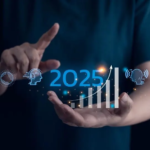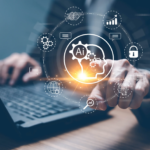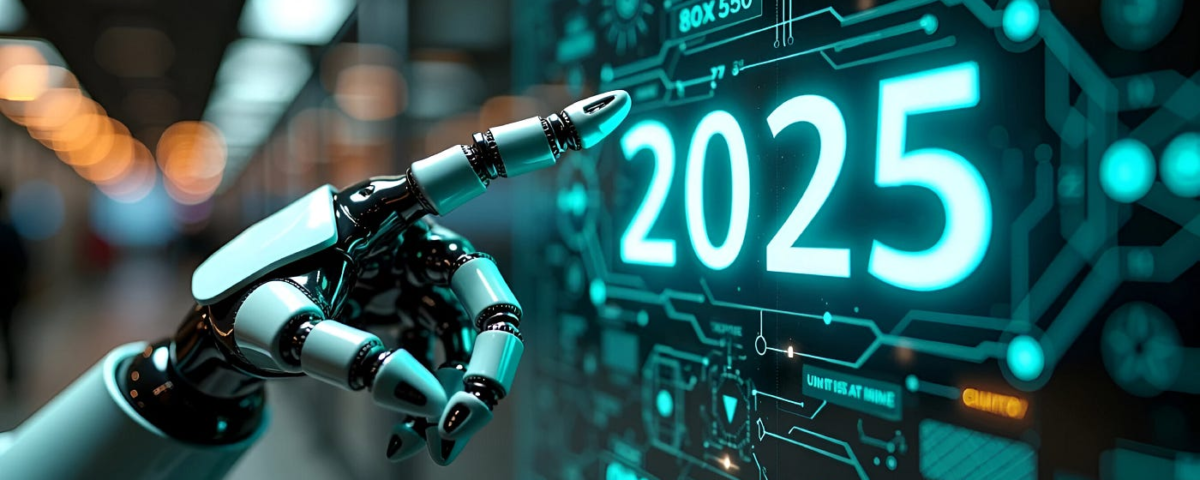
How AI Marketing Will Revolutionize Small Business Strategies in 2025
December 26, 2024
Chatbots, Predictive Analytics, and More: The AI Marketing Tools to Embrace in 2025
December 27, 2024Introduction
The marketing landscape has undergone a radical transformation in the last few years. From the early days of print ads to the rise of digital platforms, businesses have continuously sought new ways to connect with their audiences. However, the true game-changer for marketing came with the advent of artificial intelligence (AI). As we look ahead to 2025, AI is no longer just an optional tool—it’s an essential component of any marketing strategy.
By 2025, AI-driven marketing has evolved into a dynamic, highly sophisticated field that allows businesses to craft hyper-targeted campaigns, deliver personalized customer experiences, and achieve unprecedented ROI. This blog post explores the current state of AI marketing, the technologies fueling its rapid advancement, and how businesses can leverage AI in 2025 to unlock hyper-targeted campaigns for maximum returns.
The Rise of AI in Marketing
AI in marketing isn’t a passing trend; it’s a fundamental shift in how brands interact with customers. In the early 2020s, AI marketing tools primarily focused on automating tasks like email segmentation, social media posting, and customer service interactions. By 2025, AI has matured, expanding into virtually every facet of the marketing process, from customer data analysis to content creation, campaign optimization, and even real-time decision-making.
Some of the key technological advancements driving this evolution include:
- Natural Language Processing (NLP): NLP allows AI systems to understand, interpret, and generate human language, enabling better customer interactions, sentiment analysis, and content creation.
- Predictive Analytics: AI models can now analyze vast amounts of data to predict future customer behavior, allowing brands to proactively tailor their marketing efforts.
- Machine Learning Algorithms: These algorithms continuously learn and adapt, making AI-driven marketing increasingly effective over time as it “learns” from past campaigns and customer interactions.
- Computer Vision: With computer vision, AI can analyze visual content, enhancing everything from targeted ads to personalized product recommendations.
- Automated Content Generation: AI-powered tools can generate everything from blog posts to social media captions, enabling brands to scale content production without sacrificing quality.
AI and Hyper-Targeted Marketing: The Secret to Maximum ROI
In 2025, the ability to reach the right person with the right message at the right time is no longer a distant dream—it’s a tangible reality, thanks to AI. Hyper-targeted marketing campaigns are now the norm, offering businesses the potential to achieve maximum ROI by tailoring their messages to very specific segments of their audience.
1. Deep Customer Insights Through Data
AI excels at analyzing vast amounts of data to uncover deep insights into customer behavior. In 2025, AI can process not just demographic information but also psychographic and behavioral data, such as:
- Online Behavior: AI can track and analyze how customers interact with websites, social media, and email campaigns. It can identify patterns in browsing behavior, clicks, and conversion rates.
- Purchase History: AI can analyze past purchases to predict future buying habits, creating hyper-targeted campaigns based on customer needs and preferences.
- Social Media Activity: AI tools can analyze social media sentiment, trends, and conversations, allowing brands to craft campaigns that align with current consumer interests and emotions.
- Offline Behavior: With the integration of IoT devices and sensors, AI can now also analyze in-store behavior, connecting online and offline data for a more holistic customer view.
By consolidating these diverse data sources, AI helps businesses create highly segmented audience profiles that are rich in detail and more predictive of future behaviors. This segmentation allows marketers to craft personalized messages and experiences that resonate with each group, rather than relying on broad, generic approaches.
2. Personalization at Scale
One of the most powerful capabilities of AI in marketing is its ability to personalize content and messaging on a massive scale. As AI continues to evolve, marketers can offer increasingly granular levels of personalization that go far beyond basic “name personalization” in email marketing.
Here’s how AI achieves personalization at scale:
- Dynamic Content Creation: AI can automatically create customized content for individual users, whether it’s product recommendations, email subject lines, or even full-length blog posts. This ensures that each customer receives information tailored to their interests and needs.
- Behavioral Triggers: AI can monitor real-time customer behavior, such as browsing patterns, time spent on a page, and interactions with ads, to trigger personalized messages or offers. For example, a user who abandons a shopping cart may receive a tailored discount offer within minutes.
- Predictive Recommendations: By analyzing past behavior and preferences, AI can predict what products or services a customer is most likely to be interested in. This helps marketers deliver personalized recommendations in real-time, increasing the likelihood of conversion.
With AI, businesses no longer have to choose between personalizing content for a few customers or scaling their efforts. AI allows for hyper-personalized experiences across vast customer bases, ensuring that each interaction feels relevant and unique.

3. Real-Time Campaign Optimization
One of the biggest challenges of traditional marketing is the lag between launching a campaign and realizing whether it’s performing well. In 2025, AI is capable of real-time campaign optimization, which means that businesses can adjust their marketing efforts on the fly based on immediate feedback.
Here’s how AI facilitates real-time optimization:
- Automated A/B Testing: AI can automatically test different versions of a campaign—whether it’s an ad, landing page, or email—and instantly determine which variation is performing best. This eliminates the need for lengthy testing periods and allows businesses to pivot quickly.
- Budget Allocation: AI can dynamically allocate marketing budgets to the channels and campaigns that are delivering the best results. For example, if an AI system detects that a particular social media ad is outperforming others, it can reallocate funds to maximize its impact.
- Customer Sentiment Analysis: AI can track and analyze customer sentiment in real time, using NLP to gauge reactions to campaigns. If sentiment begins to dip, marketers can adjust messaging or offers to avoid negative outcomes.
- Predictive Adjustments: Based on predictive models, AI can anticipate how different factors (e.g., weather, current events, or competitor activity) might influence a campaign’s success. It can then suggest adjustments to ensure optimal performance.
With these real-time capabilities, businesses can react to changes in customer behavior, market conditions, and campaign performance immediately, ensuring that every marketing dollar spent contributes to achieving the highest possible ROI.
4. Automated and Scalable Customer Interactions
As the number of touchpoints between businesses and customers continues to grow, managing personalized interactions at scale becomes a logistical nightmare. AI solves this challenge by enabling highly personalized, automated customer interactions across multiple channels, from emails to chatbots to voice assistants.
For example:
- AI Chatbots: In 2025, AI-powered chatbots have evolved to handle more sophisticated queries and provide hyper-targeted product recommendations based on customer data. They can engage in meaningful conversations, answer questions, and even complete transactions in real-time, offering a frictionless customer experience.
- Voice Assistants: Voice search and smart devices continue to gain popularity. AI-driven voice assistants can now deliver highly personalized responses, recommend products, or even push out targeted ads based on past behavior and preferences.
- Automated Emails: AI can automatically send personalized emails at optimal times for each customer, ensuring that content is relevant and timely. These emails might contain tailored offers, product recommendations, or reminders based on past interactions.
By automating customer interactions, businesses can ensure consistent, relevant communication without the need for human intervention, allowing them to scale their marketing efforts while maintaining a personal touch.

5. Enhanced Customer Journey Mapping
Understanding the customer journey is crucial for creating effective marketing campaigns. In 2025, AI enables businesses to map the entire customer journey with incredible accuracy, allowing them to identify key touchpoints, predict future behavior, and fine-tune marketing strategies accordingly.
AI achieves this by:
- Tracking Cross-Channel Interactions: AI can integrate data from multiple channels (e.g., website, mobile app, social media) to create a comprehensive view of the customer journey. This allows marketers to see how customers are interacting with their brand across various touchpoints, from awareness to purchase.
- Journey Prediction: AI can use historical data and machine learning algorithms to predict the next steps in a customer’s journey. For instance, if a customer often browses a particular product category, AI might predict that they are ready to purchase and trigger an automated offer.
- Segmentation by Journey Stage: AI allows for dynamic segmentation based on where customers are in their journey. Whether a customer is in the awareness, consideration, or decision phase, AI can help tailor content and offers that align with their specific needs at that moment.
6. ROI Maximization with AI
In 2025, AI is the key to unlocking maximum ROI in marketing. Here’s how AI ensures businesses get the most out of every marketing dollar:
- Data-Driven Decision Making: AI enables marketers to make decisions based on data, not gut feeling. By analyzing historical performance and real-time data, AI ensures that every decision is backed by solid insights.
- Optimized Campaigns: From real-time optimizations to predictive analytics, AI ensures that marketing campaigns are continuously refined for the highest possible ROI.
- Cost Efficiency: By automating many aspects of the marketing process—content creation, customer interaction, A/B testing, and more—AI reduces the need for manual labor and minimizes wasted resources, allowing businesses to achieve greater efficiency at lower costs.
Conclusion: The Future of AI Marketing in 2025
As we move toward 2025, it’s clear that the future of marketing is inextricably linked to the evolution of artificial intelligence. AI’s capacity to process and analyze massive datasets, predict consumer behavior, and automate personalized customer experiences makes it an indispensable tool for businesses aiming to thrive in an increasingly competitive marketplace. The shift from traditional, broad-spectrum marketing to hyper-targeted campaigns allows brands to forge deeper connections with consumers, providing them with exactly what they need, when they need it.
However, as we’ve explored throughout this post, the real power of AI marketing lies not just in its ability to optimize existing processes but in how it enables businesses to innovate, adapt, and scale in ways that were previously unimaginable. In the coming years, companies that strategically leverage AI will be better equipped to achieve maximum ROI by delivering highly relevant, personalized experiences that not only attract but retain loyal customers.


